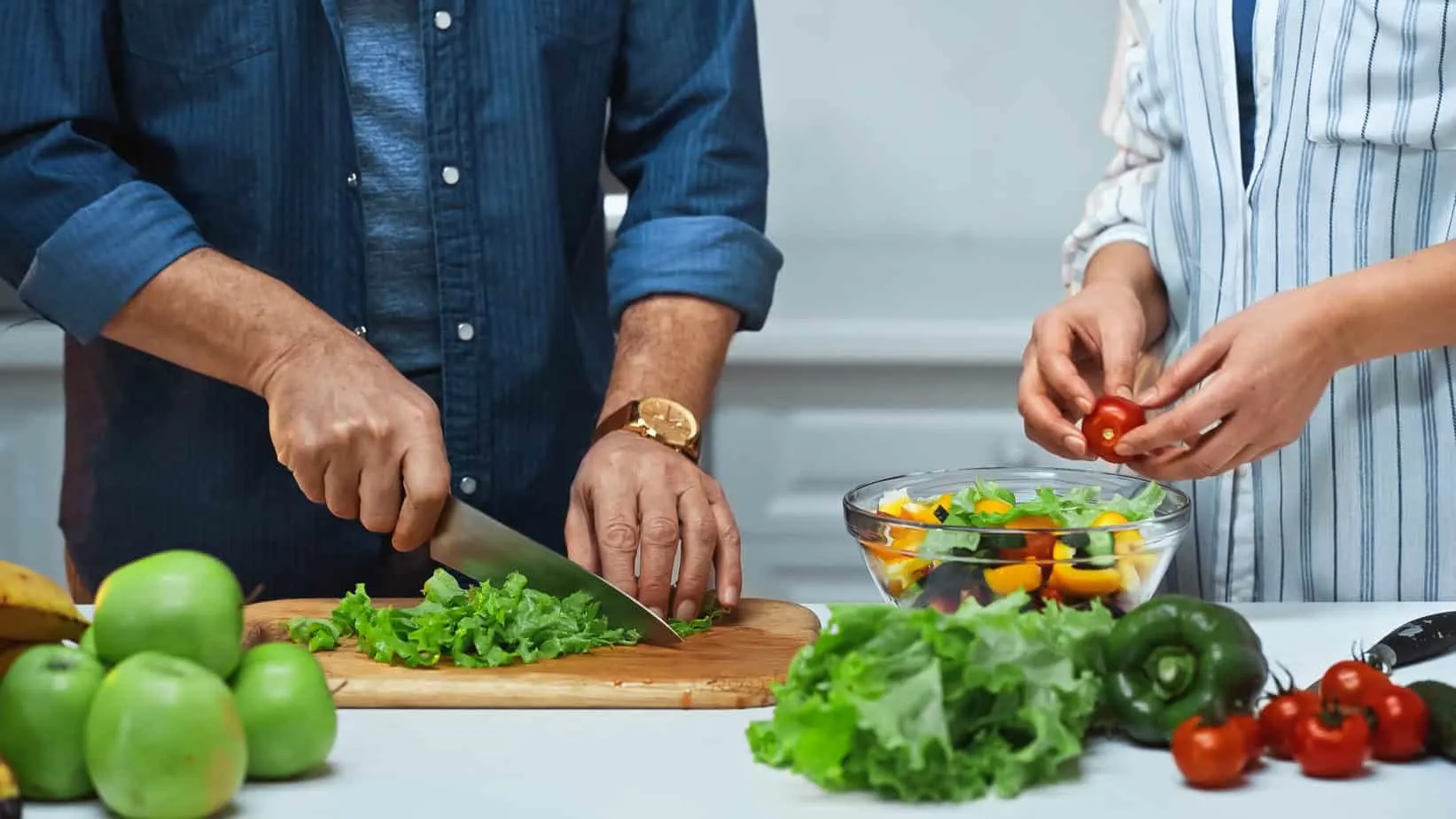There once was a time in my life where everyone I knew could eat anything that they want without fear. Sure, there were those on diets by choice, but mostly, people could serve something and know that everyone would eat it. For some reason, things have greatly changed and allergies and intolerances are very common. This isn't just a viral trend that everyone wants to jump on. Trust me when I say that no one wants to have to limit what they eat, so it is time that everyone learns how to be thoughtful and how to create a safe and inclusive table for guests with food allergies and intolerances.

My story
For much of my life, I had horrible stomach aches that would come out of nowhere. I first noticed it after drinking a full glass of milk as a teenager. I always drank milk, but for some reason, that day my body wasn't having it. So, I started limiting dairy.
Fast forward to when I became pregnant with my first son, I was able to eat anything without stomach aches. It was amazing! Soon after his birth, the stomach aches returned but this time with more frequency. Was it the hormones, stress, lack of sleep, or just the fact that a tiny human was dependent on me and made me not take great care of myself? Or had my body changed in a way that I wasn't prepared for?
Things actually got worse after each birth and by the time our third son was 1, my stomach aches had become more frequent and I realized I had to do something. I went to different doctors to try to figure out what was wrong. No one was able to help me, even after multiple tests.
So, I made a decision for myself and decided to go gluten free, just to see how it helped..or didn't. Within weeks, my stomach aches lessened and my health and emotional state got better. I had more energy and I knew that I had made the right decision, no matter that it was extremely hard to manage with a husband and 3 sons who loved gluten.
I learned all about Whole30 and ways to cook things without gluten. I learned about hidden sources of gluten and easy swaps that I could make that were still delicious.
It has been 9 years since I took control of my health and made this lifestyle and diet change. I don't have an official medical diagnosis, but I know that my body doesn't tolerate gluten well.

Inclusion is easy
As I have met and talked to people who are gluten free over the years, one thing has always stood out: some people just don't understand and all that we want is to be included. Someone may know that you have an allergy or intolerance, but forget when they invite you over to their house.
"As a health coach and someone who has food sensitivities, I have had to learn how to navigate gatherings and eating out at restaurants with grace. I have had many occasions where I was told in a restaurant that something was gluten free, however, it was not.
Now, I always do the research before I head out so I know what is gluten free and I plan ahead what I will order. This has made things so much easier. When I am invited into someone's home to dine I always bring something I can eat so I know at least one dish is gluten free. I will ask nicely how dishes are prepared if it something I am unsure of. I always stick naturally gluten free foods like fruits, vegetables, eggs, and dairy products." Karen Kelly, Seasonal Cravings
I do believe this comes, in part, from the age where everyone was supposed to "get what you get and don't throw a fit," clean your plate, and pickiness was never tolerated.
Well, friends, food allergies and intolerances are NOT pickiness.
When you have a food intolerance, it can be extremely painful, embarrassing and annoying. When you have a food allergy, it can be life threatening. It shocks me when I find out that people who know my son has a tree nut allergy, but don't realize how serious it could be.
People have a lot to worry about these days, and if someone has a food allergy or intolerance, they simply have to advocate for themselves. That is the first step. But every few months, you will hear in the news of someone who has died because while they were extra vigilant, someone along the way didn't take it seriously. This is extremely negligent and wrong.
"In our family, we have an intolerance to gluten and anaphylactic allergies to tree nuts, peanuts, and eggs - we can’t take any chances when it comes to food! If the host does not ask for dietary restrictions ahead of time, which so many are kind enough to do now, I contact them to share our allergies and offer to bring safe options.
I never want to put anyone to extra work. I find that we do have to ask about ingredients rather than, “is this gluten free?” because even the most well-meaning hosts may not be familiar with all the places our allergens can hide. A friend once was thoughtful enough to confirm our allergies ahead of a dinner party but then mentioned soy sauce. She was shocked when I mentioned that it contains gluten and offered to bring a gluten free version!" Ashley Wali, Wanderlux
Why wouldn't someone offer allergy friendly food to their guests?
Here are some common reasons why people may not offer allergy or intolerant friendly food when hosting:
Lack of Awareness
- They may not understand what the allergen is or the seriousness of conditions like celiac disease or allergies.
Perceived Complexity
- They might think allergy friendly cooking is too difficult, requires special ingredients, or involves complicated recipes.
Fear of Making Mistakes
- Hosts might worry about accidentally cross-contaminating dishes and harming their guest.
Limited Experience
- They may not have prior experience with special cooking and feel unprepared to accommodate dietary restrictions.
Cost Concerns
- Allergy friendly products can sometimes be more expensive, which might deter people from purchasing them.
Misconceptions About Taste
- Some hosts assume allergy friendly food tastes bland or unappealing and worry it won't satisfy their other guests.
Overwhelmed by Planning
- Hosting an event already involves a lot of planning, and dietary restrictions may feel like an additional burden.
Guest Didn't Inform Them
- The host may not know about the dietary restriction if the guest didn't communicate it in advance.
Limited Availability
- Depending on their location, hosts might struggle to find ingredients or products.
Unwillingness to Adjust
- Some people might feel resistant to altering their traditional menu or recipes or feel that "it's ok to have it just once," when in reality, it's not true.
By addressing these barriers with knowledge, preparation, and empathy, hosts can create a welcoming and inclusive environment for everyone.
"Being celiac, I’ve learned to navigate the uncertainty of eating out or at gatherings with grace and caution. If I’m unsure whether a meal is gluten-free, I politely ask questions about the ingredients or preparation method—most people are understanding when you explain it’s for health reasons. I also try to bring a safe backup snack or meal just in case, so I’m not left hungry or stressed. It’s all about advocating for yourself while staying kind and flexible in social situations."
Bella Bucchiotti, xoxoBella

How can hosts help their guests with food allergies and intolerances?
Here are some effective ways hosts can ensure they’re accommodating food allergies and intolerances before the meal:
Ask Directly in the Invitation
- When inviting guests, include a note such as, "Please let me know if you have any dietary restrictions or allergies so I can plan accordingly."
Follow Up Personally
- If you’re unsure or want to double-check, follow up with a quick text, email, or call to ask about any specific needs.
Share the Menu in Advance
- Provide guests with a rough idea of the menu and ask if there’s anything that doesn’t work for them. This also opens the door for them to mention any restrictions.
Use a Guest Preference Form
- For larger or recurring events, create a simple Google Form or survey where guests can note dietary needs.
- You can also use the same opportunity to ask guests if they would care to bring their own food or suggest a safe alternative to something you are preparing.
Ask About Severity
- Clarify how serious the allergy or intolerance is. For example:
- Is cross-contamination a concern?
- Should you avoid even trace amounts of an allergen?
Communicate Early
- Reach out well in advance of the event to allow time to adjust the menu or purchase special ingredients.
Include It as a Group Question
- If inviting multiple people, ask the group something like, "Does anyone have dietary preferences or allergies I should know about?"
Consult a Trusted Guest
- If someone has a complex restriction, ask them for guidance, recipes, or even prepackaged food that they love to help you plan.
Research Common Allergens
- Familiarize yourself with common allergens (e.g., gluten, nuts, dairy, shellfish) to be more proactive in planning.
Double-Check Store-Bought Items
- When using pre-made food, check ingredient lists and allergen warnings to avoid unintentional mistakes.
These steps show thoughtfulness and care, helping guests feel comfortable and included.
How can hosts make absolute sure their food is safe?
Taking food allergies and intolerances into consideration when planning a meal helps everyone feel safe and included.
I understand the fear, however, especially dealing with life threatening food allergies. If you are afraid of not doing something right, here are some options that you can offer to your guests who need it.
Offering a 100% food-safe meal for guests with allergies or intolerances requires careful planning and preparation. Here are some steps hosts can take:
Plan a Menu with Inclusive Options
- Simple Recipes: Choose dishes that naturally avoid allergens (e.g., grilled vegetables or fresh fruit).
- Customizable Dishes: Offer a "build-your-own" option, such as tacos, salads, or pasta, with allergen-free bases and toppings.
- Label Food: Use cards or signs to indicate which dishes are allergen-free.
Prevent Cross-Contamination
- Clean Thoroughly: Wash all cooking utensils, cutting boards, and surfaces with hot, soapy water before cooking.
- Separate Utensils: Use separate pots, pans, and utensils for allergen-free dishes.
- Dedicated Prep Areas: If possible, prepare allergen-free dishes in a separate area.
- Avoid Shared Containers: Use new jars, condiments, and butter to prevent cross-contact.
Read Labels Carefully
- Check ingredient labels for hidden allergens or contamination warnings like “may contain traces of...”
- Choose certified allergen-free products when available (e.g., gluten-free, nut-free).
Serve Allergen-Free Dishes First
- Serve allergen-free foods before other dishes to prevent accidental contamination during plating.
Use Dedicated Serving Tools
- Assign specific serving utensils to allergen-free dishes and label them if necessary.
8Notify Guests of Risks
- If you’re not 100% sure about a dish’s safety, let guests know so they can make informed choices.
Offer Beverages and Snacks Safely
- Don’t forget about drinks, condiments, and snacks—check these for allergens, too.
Keep Emergency Info on Hand
- Be prepared for a reaction by knowing where the guest’s epinephrine auto-injector (EpiPen) or other emergency medication is, if applicable.
- Know emergency contact numbers or procedures, just in case.
Involve the Guest
- If the guest feels comfortable, invite them to help review your ingredient choices or bring a dish they know is safe.
Taking these steps demonstrates thoughtfulness and ensures a safer dining experience for everyone.
I also want to add that this should also apply to those with religious or moral reasons. If you know your friend is vegan, please respect her and don't say "what she doesn't know won't hurt" as you realize there was butter in the mashed potatoes. That is unkind and not being a good human being.
It also is not being a good human being to make someone "prove" their allergy. I was at a small restaurant once and a waitress was asking a woman for "a doctor's note" regarding her allergy. This should not be a thing, ever. Maybe she had her reasons, but she came off as a jerk. If someone says they cannot have xyz, it's our job to honor that.
"As someone with food sensitivities to gluten, dairy, and eggs, I always approach meals with caution, especially when I’m unsure of the menu. I find it's best to communicate openly with the host beforehand about my specific needs, explaining that it's a health concern rather than a preference. I completely understand that these restrictions are challenging to work with so, if it's too much of a hassle, I bring my own dish to ensure I have something safe to eat. If it's a potluck style meal, I'll casually ask questions about ingredients when I arrive, and I never hesitate to skip a dish if I'm unsure about cross-contamination or hidden allergens. Meals have grown to be more about the company and companionship and less about the food. Prioritizing my health in this way can be hard sometimes but I've found success by being proactive and respectful to others while never expecting anyone to know about or consider my needs ahead of time unless we talk about it specifically. These strategies have helped me enjoy social situations while also making sure I can partake in the meal without worrying about any negative reactions."
Jessica Haggard, Primal Edge Health
If there is one more thing that I can add to this article, I will say, please do not offer a salad as an alternative to the main meal. When my son was in band and they provided food, the leaders were so good to make sure that they were aware of food allergies. However, most times the gluten free meal option was salad. Salad is NOT an alternative meal when other teenagers are getting pizza. Your alternative food does not have to be gluten free pizza, but for the love, give them more sustenance than a salad.
Please let me know any thoughts, tips, tricks, or experiences you have had, either as the host trying to navigate food allergies and intolerances, or as someone who has to live this, day after day, to manage your health!
